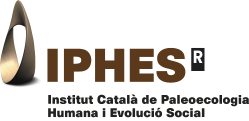Staff
Burguet Coca, Aitor
Researcher
E-mail: aburguet@iphes.cat
Sponsor: Postdoctoral Beatriu de Pinós - Agència de Gestió d'Ajuts Universitaris i de Recerca (AGAUR)

Aitor Burguet-Coca (Balaguer, Far west of Catalonia, 1990) is a postdoctoral researcher with a strong interest in pyroarchaeology and the use of plans in human evolution. His approach combines microarchaeological techniques from archaeobotany (phytoliths), mineralogy (FTIR) and chemistry (biomarkers), from a perspective that combines field archaeology, experimental archaeology and ethnoarchaeology. To date, his scientific interests and output have encompassed the study of a wide variety of materials, archaeological contexts and questions, structured around four main lines of research: 1) Palaeolithic pyroarchaeology and fuel management 2) Fire sequences and animal-plant interactions 3) Experimental archaeology and modern reference collections 4) Etnoarchaeology of fuel and fire.
His current postdoctoral project (Batriu de Pinós MSCA-COFUND, IPHES-CERCA) focuses on obtaining relevant data in terms of palaeoecological reconstruction and hearth function in Middle Palaeolithic sites, in order to deepen the knowledge of the fire production capacity of Neanderthals. To this proposal I will add new analytical skills -microcharcoal & archaeomagnetism- to the techniques used so far -phytolits, FTIR, biomarkers- and I will work on new sites -Roca dels Bous & Mas Trader-.
Research career
His first contact with prehistoric archaeology was in 2008 at sites in the Catalan foothills of the Pyrenees, such as Cova Gran or Roca dels Bous, where he is still involved. He has a degree in History from the Autonomous University of Barcelona, a Masters in Quaternary Archaeology and Human Evolution from the Universitat Rovira i Virgili and a PhD in Quaternary and Prehistory from IPHES-CERCA and the Universitat Rovira i Virgili.
It was during his Master's degree that he began to take an interest in microarchaeological techniques applied to the fire record, conducting a study that allowed to evaluate the presentation of phytolith assemblages in the Cova Gran sequence. During his doctoral thesis he deepened the Cova Gran levels, which had presented better results, using new microarchaeological techniques - dung spherulites and infrared spectroscopy - based on new approaches - experimental archaeology - and new archaeological sites - El Mirador-, which allowed him to cover a wide chronocultural range from the Middle Palaeolithic to the Bronze Age. His research demonstrates the usefulness of analysing the pyroarchaeological record to address aspects related to the formation processes, as well as a wide range of behavioural aspects: herd diet, seasonality; economic and cultural management of the fumieres in recent prehistory; the dynamics and intensity of human occupation, fuel gathering and plant use by hunted gatherers; and the pyrotechnological abilities of Neanderthals and Sapiens, among others.
His postdoctoral period (Margarita Salas and MSCA-IF, Leiden University) implied a chronological and objective change in his trajectory, focusing on the Middle Pleistocene fire record and searching for robust data on the earliest evidence of fire. It also involved an improvement in the analytical approach, combining techniques consolidated in his predoctoral period with the application of chemical techniques for the identification of biomarkers related to anthropogenic fire use (PAHs). This has allowed him to review indirect and poorly studied evidence of fire at La Cansaladeta and La Sima del Elefante, and to test a new cross-cutting methodological approach to apply to the pyroarchaeological record with low visibility. In parallel, he has started to build up an experimental reference collection to establish the chemical signal of different biomarkers in Palaeolithic fires, to understand their signal, characteristics and preservation; and he has initiated a new line of ethnoarchaeological research, leading the archaeological part of the fieldwork with the Masaai communities in Tanzania.
Milestones of his research career:
2024-curretly - Beatriu de Pinós MSCA-COFUND. Catalan Institute of Human Paleoecology and Social Evolution (IPHES-CERCA), Tarragona, Catalonia.
Granted-notincorporated - APOSTD Fellow. Universitat de València, València, Valencian Country.
2023-2024 - Marie Skłodowska-Curie Individual Fellow. Leiden University, Leiden, Netherlands.
2022 - Margarita Salas Postdoctoral Fellow. Leiden University, Leiden, Netherlands & Universitat Rovira i Virgili, Tarragona, Catalonia.
2015-2020 - International Doctorate in Quaternary and Prehistory - Universitat Rovira i Virgili & Catalan Institute of Human Paleoecology and Social Evolution (IPHES-CERCA) Tarragona, Catalonia.
2012-2014 - Master’s Degree in Quaternary Archaeology and Human Evolution. Universitat Rovira i Virgili, Tarragona, Catalonia.
2008-2012 - Bachelor’s degree in History. Autonomous University of Barcelona, Barcelona, Catalonia.
Research outputs
He has published 17 scientific papers in indexed journals (Scopus), 5 chapters in international series and 4 articles in national journals. His adherence to Open Science is based on the publication of some of the papers in OA and his participation in the Open Science Working Group (OSWG) in IPHES-CERCA.
His research has been presented in 40 national and international conferences, seminars and workshops (29 communications; 11 posters), including general conferences (EAA, UISPP), specialised conferences (International Meeting on Phytolith Research) or site workshops. He has co-organised scientific meetings as Reunió Oikos de Bioarqueologia (Online, 2021 & Girona, 2023) and as promoter and co-organiser of the Seminari d'Arqueobotànica (Tarragona, 2017, 2018, 2019 & 2021). He organised the international symposium 'Fire in Human Evolution', where more than 30 researchers from all over the world discussed the main advances in fire from a transdisciplinary perspective (Leiden, 2024).
Fieldwork has accompanied him throughout his career, giving him extensive experience both nationally (over 20 sites) and internationally (Malta, Mongolia, Italy), with scientific responsibilities in many of them, such as coordinating research related to the pyroarchaeological record or the sampling and recovery of archaeobotanical remains. His international experience is completed by research stays at the Max Planck Institute for Evolutionary Anthropology (Germany) and Rutgers University (USA).
To date, he has been involved in 26 research projects of different scope and funded by different bodies, three of which are led or co-led by him. He has also obtained 4 competitive postdoctoral fellowships in different national and international calls.
You can see more information in his web page: https://sites.google.com/view/aitor-burguet-coca/home?authuser=0



